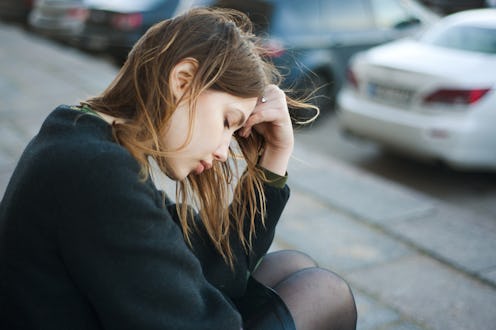Life
Why Being Rejected By Someone You Weren't Interested In Still Hurts

As tough and secure about ourselves as we may be, we might still feel the sting from time to time when we find out someone doesn't like us back. And sometimes, this sting comes even when we don't necessarily like the other person all that much. Even if you don't feel or express an interest in another person, rejection from someone you don't want to date can still hurt.
"For many people, the fear of rejection and the desire for acceptance are the main motivating forces for all actions in their lives," Julia McCurley professional matchmaker, relationship coach, and CEO of Something More, a matchmaking service for Austin executive singles, tells Bustle. "So when we get rejected, we try to figure out what we could have done differently to prevent this from happening again."
This is sometimes still the case even if we aren't interested in the person we were rejected by. "When we get rejected, it makes us feel like an outsider and different from everyone else and it's human nature to want to feel a part of a group and fit in with society," McCurley says. She explains that we usually consider other people's approval of us (especially in a romantic sense) as a stamp worth. And when anyone takes this stamp away, we feel broken up about it. "We often look to romantic partners as a method of establishing our worth," she says. And this can be the case whether we want to date that person or not.
Emile Depasse, sexologist and sex educator, tells Bustle that despite whether or not we're interested in another person, we can be interested in their opinion of us. "Rejection is a confrontation of something within ourselves that wasn't quite 'right' for someone else," she says. "It can lead to a spiraling of questions as well as internalized shame from prior experiences of rejection or insecurities we're still struggling to overcome." She adds that when we are rejected we can take it personally, despite the circumstances. And oftentimes, this leaves us with a nagging uncertainty of "why" and what it was that made us "unfit" for another person.
"It is especially insulting when you rejected them in the first place," Clarissa Silva, behavioral scientist/relationship coach and creator of Your Happiness Hypothesis Method, tells Bustle. "It psychologically becomes two things: outrage that they thought so highly of themselves to begin with and that you begin to question elements of yourself that led to the rejection."
"Even if we are rejected by someone we were not interested in dating, rejection can still hurt because it can lead us to question ourselves and our ability or likelihood to find a partner," Dr. Sharone Weltfreid, a PhD and licensed clinical psychologist who focuses on relationships, tells Bustle. "Rejection sends the message that we are not wanted or valued enough. The more we are rejected, the more sensitive we can be to the experience. Every rejection is just more validation that we are 'not good enough' in some way." But Silva says that eventually, we get better at handling rejection. "Fortunately, the more you are exposed to rejection, the more you are able to dismiss and internalize the rejection," she says.
Depasse emphasizes that getting rejected can make it easier to find someone right for you, especially if you weren't even interested in the other person in the first place. "Rejection can mean less time wasted and more time invested in a potential dating partner or relationship," she says. "With rejection, there is acceptance and closure and the empowering freedom to find someone who speaks and understands your truths."
Still, despite the potential upsides of rejection, it can hurt. And if you find yourself feeling disappointed or let down by a rejection — even one from someone you don't want to date — it's important to remind yourself that the rejection is not a reflection of you lacking in any shape or form, McCurley emphasizes. "Remember that rejection is much better then having your time wasted," she says. "Rejection allows you to move forward. What you don’t want is someone leading you on only to waste your time." So even if a rejection stings a little extra, it's important you tell yourself that it doesn't affect how great you are — it only means the other person isn't the one for you.
Experts:
Julia McCurley professional matchmaker, relationship coach, and CEO of Something More
Emile Depasse, sexologist and sex educator
Clarissa Silva, behavioral scientist/relationship coach and creator of Your Happiness Hypothesis Method
Dr. Sharone Weltfreid, PhD, licensed clinical psychologist
This article was originally published on